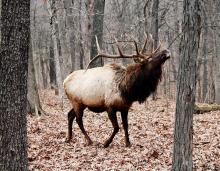Mammals
Media

Species Types
Scientific Name
Ursus americanus
Description
One of the largest wild mammals in Missouri, the American black bear is unmistakable with its black fur and powerful bearing.
Media

Species Types
Scientific Name
Canis lupus
Description
The gray wolf originally ranged throughout Missouri, but with settlement the species was gradually exterminated. While there is no evidence of a breeding population in the state, wolves are listed as a protected species in Missouri, and they occasionally wander into Missouri from northern states.
Media

Species Types
Scientific Name
Odocoileus virginianus
Description
In summer, white-tailed deer are reddish-brown to tan above; in winter, they are grayish. The throat and belly are white. This common Missouri deer is named for the bright white of its flaglike tail.
Media

Species Types
Scientific Name
Sus scrofa
Description
Feral hogs cause millions of dollars in agricultural, environmental, and property damage. As they root and wallow, they plow the soil to depths of 2–8 inches — sometimes for many acres! And this is just the beginning of the trouble they can cause to humans, livestock, and the environment.
Media

Species Types
Scientific Name
Cervus canadensis
Description
Very large members of the deer family, elk are brown or tan above with darker underparts, with a thick neck and yellowish-brown rump patch and tail. Elk have been restored to portions of Carter, Reynolds, and Shannon counties.
See Also
About Mammals in Missouri
More than 70 species of wild mammals live in Missouri: opossums; shrews and moles; bats; rabbits; woodchuck, squirrels, beaver, mice, voles, and other rodents; coyote, foxes, bear, raccoon, weasels, otter, mink, skunks, bobcat, and other carnivores; deer and elk; and more. Most of us recognize mammals easily — they have fur, are warm-blooded, nurse their young, and breathe air.





















